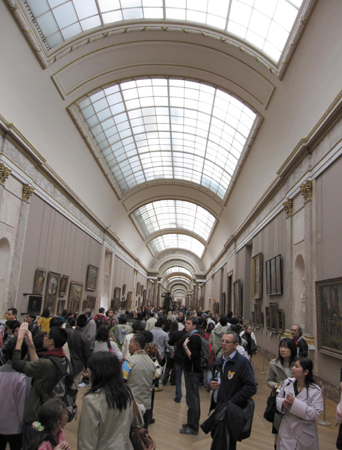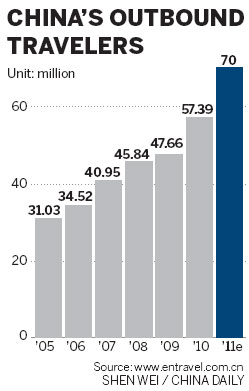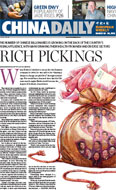Photos
Getting the travel bug from movie locations
Updated: 2011-03-21 09:13
By Du Juan (China Daily)
Visitors, including many Chinese tourists, at the Louvre in Paris. The world famous art gallery and the renowned French department store Galeries Lafayette are popular destinations for the Chinese when they visit Europe. [Photo / China Daily]
Exotic backdrops in films inspire tourists to visit to see for themselves

BEIJING - The Hollywood romantic thriller The Tourist has not only entranced audiences worldwide but has also inspired people to visit Italy in person.
Xie Qinglong, 26, an office clerk in Beijing, said he watched the film with his wife two weeks ago and they very much enjoyed the backdrop. As a result, they are planning to visit Italy this summer.
They will face plenty of choices when they book the tour because many travel agencies have already seen the business value in such movies. Among companies that have developed new products to promote Italy as their key resort is Beijing UTour International Travel Service Co.
Because of the nuclear crisis in Japan and the earthquake in New Zealand, European countries such as Italy and France are expected to be the favorite destinations for Chinese tourists in the near future, industry analysts said.
As Chinese consumers become more mature in choosing where to go and the agencies get to know their target customers better, the traditional low season - March, April and May - has all but been eradicated.
Ma Nan, assistant director in the marketing department at UTour, said Chinese tourists no longer want to travel to as many places as possible in the least number of days or hurry from one place to another.
"The Chinese are getting to realize that a vacation is a time to relax and have fun," Ma said. "As a result, they are taking the service and quality offered by agencies more into consideration than before when choosing a break. Also, young people are more likely to go to places with cultural and artistic associations."
Ma said her company is now promoting a product called "French wine culture tour". It involves visiting famous cellars in France over nine days. Thanks to the popularity of the Chinese love film Eternal Moment, which was shot in Bordeaux, they made the French port city a main base for the tour.
"The cellars in Bordeaux were not an important venue in our tours before, but many customers asked about the place following the film, so we decided to add it to the agenda and make it a central destination," Ma said.
Even though the price of the tour is almost 10,000 yuan ($1,522) higher than other French tours, it still attracted many inquiries and bookings.
Ma said it is not the first time the agency has used films as a promotion for its products. Staff believe movies can provide the best explanation of local culture and character to the audience.
The film If You Are the One in 2008 attracted many Chinese tourists to Hokkaido, Japan's northernmost island. UTour even designed a schedule that included places where scenes were shot. Tomb Raider helped make Angkor Wat in Cambodia a popular destination for tourists. Ma said the agency used the film to promote tours to Cambodia because "it will remind people of the film and they will get a more vivid impression of the place".
"We can raise the price a little higher if we label the tour as cultural and artistic. People are happy to pay more when their passions are roused," she said.
Wang Yanyong, director of the Research Center of Tourism Development and Planning at Beijing Jiaotong University, said Chinese tourists have moved on from simple sightseeing to relaxation because they are richer and the price of the trips is lower than before.
According to the National Tourism Administration, the number of Chinese who traveled abroad was 57.39 million in 2010, ranking the country third in the world. The administration estimated that the number is expected to reach 70 million this year.
In addition to cultural tours aimed at young people, travel agencies also work hard to attract the elderly because most of them have retired and so are able to go abroad outside the more expensive peak periods - and save money.

Many agencies have designed special themes such as flower tours and health-promoting holidays for the aged. The schedule is not intensive and the tourists don't need to spend too much time on the journey.
Beijing Caissa International Travel Service Co promotes dozens of tours for the elderly across Europe, America, Australia and Asia. However, because of the 9.0-magnitude earthquake in Japan, most recent tours there have been canceled and refunds given.
The company said the earthquake would influence sales of its Japan tours in the short term. It is waiting to see whether it will affect the entire year or beyond.
Chen Jie, director at the producer development center with Caissa, said elderly people will be major customers in the spring and an increasing number of people are booking tours for their parents as a gift.
Liu Ding, an office clerk, booked a trip to Africa for his parents with Caissa after the family came back from a trip to the Republic of Korea during this year's Spring Festival.
"We traveled together at Spring Festival because I only get a holiday then and it is a precious time for the family to relax together and have fun after a year of working hard," Liu said.
His parents are both in business and have flexible working schedules, so Liu booked a trip to Africa for them.
"The place is cool because it's different from the regular tours to Europe, the United States or Australia. I want my parents to enjoy something different, such as the African cultures and the unique natural environment," he said.
Chen said: "Young people care more about the quality and coziness of the tour when they choose holidays for their parents, so we promote some cruises to nearby countries, so the elderly don't need to take tiring flights."
The travel agency send text messages every day to the tourists' children to let them know their parents are safe.
UTour even add one tour guide to each tour group in order to take care of older members better.
Ma at UTour said trips for the elderly sold well. Forty percent of them were booked by people for their parents.
Spring Festival, although elsewhere considered mid-season, is actually a high season for Chinese tourists because people get a long holiday. As a result, the price is higher than at other periods. Chen at Caissa said the tour prices were raised by 20 to 30 percent during the festival.
The price of flights and hotels can fall substantially immediately afterwards.
The price of a tour to Phuket Island in Thailand with Caissa is currently 50 percent lower than a month ago. It is a good incentive for the elderly to travel now.
The 11-day Australia and New Zealand tour for the elderly at Caissa is increasingly popular even though its price is not much lower than it is in spring because of additional activities such as spas and thermal springs in New Zealand's Rotorua during a visit to see the giant redwoods, something considered suitable for older folk.
To attract more customers, Caissa, a traditional travel agency whose targets are high-end consumers, is planning to promote group-buying as a new marketing method because the rapidly growing number of online travel agencies are taking up an increasing market share in the industry.
Ctrip.com, a major Chinese online travel booking website, offers 70 percent discounts for certain products to places including Hong Kong, the island province of Sanya, Greece and Phuket Island every Wednesday afternoon.
The company said 80 percent of the discount tours are sold in the first 15 minutes. "The prices of certain tours that Ctrip offers are extremely attractive," said Xiao Bang, 25, a bank clerk in Beijing.
Caissa said discounted prices do not mean low quality products.
"B2C (doing business with group-buying customers online) has brought us a new way of consuming and Caissa wants to use it to lure more people to buy our products," said Chen Xiaobing, president of Caissa.
| ||||
Han Yang, 25, a white collar worker in Beijing, said she wouldn't choose group-buying because she considers the tremendous savings "unbelievable".
"I wonder whether the service and quality will be reflected in a low pricing policy," she said. "If there are discounts for the flight tickets or hotels, I can manage to book them by myself."
She plans to travel to Qingdao next month by herself instead of booking a tour with a travel agency because "I want to wake up in my own time instead of being called by the tour guide".
But for overseas trips, most Chinese people still prefer to use travel agencies because they are familiar with the environment abroad.
Ma at UTour, said she doesn't worry about the traditional slack season because "there is no obvious slack season in tourism nowadays".
E-paper

City of Joy
Welcome to the 'world of smiles' where life meanders slowly.
Debate on nuclear power revived
The future is now
Common approach
Specials

Earthquake Hits Japan
A massive 8.8 magnitude quake hit the northeast coast of Japan on March 11,2011.

NPC & CPPCC sessions
Lawmakers and political advisers gather in Beijing to discuss major issues.

Slide: Japan quake
Devastating earthquake and tsunami left millions without water, electricity, homes or heat.



